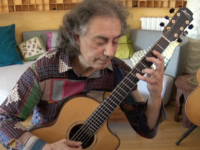The Hot Club of Philadelphia was started in 2001 by guitarist Barry Wahrhaftig. An acoustic ensemble, they are dedicated to playing “Gypsy jazz.”
Their inspiration is the legendary original Hot Club of France quintet, led by guitarist Django Reinhardt and violinist Stephane Grappelli – which itself was a version of American “hot jazz,” as played by stars like Louis Armstrong and Duke Ellington but using acoustic guitars, bass and violin, rather than horns and drums. Grappelli and Django added some French and Gypsy flavors, and created a blend of music that is popular and accessible.
The Hot Club of Philadelphia’s previous releases include Wrap Your Troubles in Dreams (2010) and Gypsy Routes (2015). They perform in different ensembles – trio, quartet, quintet – and have played venues including the Kimmel Center’s PIFA Festival, the World Café Live, Sellersville Theater, WHYY-NPR, Musikfest-Bethlehem, Pastorius Park Summer Festival, the Philadelphia Folk Festival and many more.
“Blue Drag” opens their new album Gypsy-Americana and is a wonderfully laid-back blues number, written by Joseph Myrow and given a lilting rhythm with violin soaring with the melody over steady accompaniment. There is a short guitar solo, answered by another section of sighing violin, and another response from guitar before the bass works its way in and solos. Just the strings on this track, but they make a wonderful sound.
“Melody au Crepuscule (Love’s Melody)” is beautiful, evoking pictures of summer landscapes – light, slightly frothy but giving the sense of not having a care in the world. There is a very pleasant guitar interlude and the playing is tight and very engaging. “Du Djaial (Sinti Waltz)” is fast paced and the vocals from Titi Bamberger add a gorgeous male presence to the piece. The tempo speeds up almost infinitesimally as the track progresses, which is clever and gives a sense of intensity. Stephen Foster’s “Hard Times” is a song told in great narrative by Barry Wahrhaftig. Its sorrowful lyrics are powered along by great harmonies from the Hot Club of Philadelphia, and some beautiful acoustic guitar, lifting everything out of the gloom and doom. Great interpretation and a hopeful ending.
Jay Ungar’s “Ashoken Farewell” has an almost Celtic feel to its opening, with violin singing out over guitar backing and it becomes a gentle, swaying piece in 3/4 time with a sense of longing and lament worked into the arrangement – particularly the final violin phrases. “When Everything’s Better” is sassy, rather cool and hits the off-beat with a fervor which is catchy. There is an energy in this track which is undeniable.
Bob Haymes’ and Marty Clark’s “They Say It’s Spring,” originally made famous by Blossom Dearie, has lead vocals from Denise King (Lex Humphries, Ted Curson, Arthur Harper, Brecker Brothers, Cecil Payne, Cecil McBee, Sid Simmons and more). She delivers in style and grace over Dave Hartl’s piano backing and subtle guitar. “Hymne a L’amour” sees Phyllis Chapell (SIORA), delivering Piaf and Monnot’s number – sung in French and English over gorgeous piano lines from Dave Hartl in a sumptuous duet.
“Lover Man” is sung here by Meg Rozinski (Strangers, Bounce) in glorious, sassy style over supportive strings and subtle drums and a rather lovely, gentle tenor sax solo in a great interpretation of the number made famous by Billie Holiday, but delivered with a unique character by the Hot Club of Philadelphia. “Sons de Carrilhoes (Sound of Bells)” is light and very sweet, a solo number from Barry Wahrhaftig on acoustic guitar delivered in bossa/choro – both Brazilian instrumental styles, which suit this perfectly. There is a subtle but clear nod to a more Western interpretation in the rhythms, as well.
Leonard Cohen’s “Dance Me to the End of Love” is given not only the Gypsy treatment, with full on band including trombone, trumpet and alto sax, but also has a strong Klezmer influence. The results sound like a dalliance of Cohen with a Ruska Roma lover.
The Hot Club of Philadelphia’s Gypsy-Americana is engaging and interesting because within it are influences of ’70s rock and pop, jazz, traditional Gypsy tunes and a whole host of others which are difficult to pin down. The overall effect is joyful, very listenable and well worth the five-year wait for fans.
- Milena Casado – ‘Reflection of Another Self’ (2025) - May 4, 2025
- Luis Ianes and Noel Akchote – ‘Seuil’ (2025) - April 12, 2025
- David Dower Trio – ‘Sonder’ (2025) - March 23, 2025




